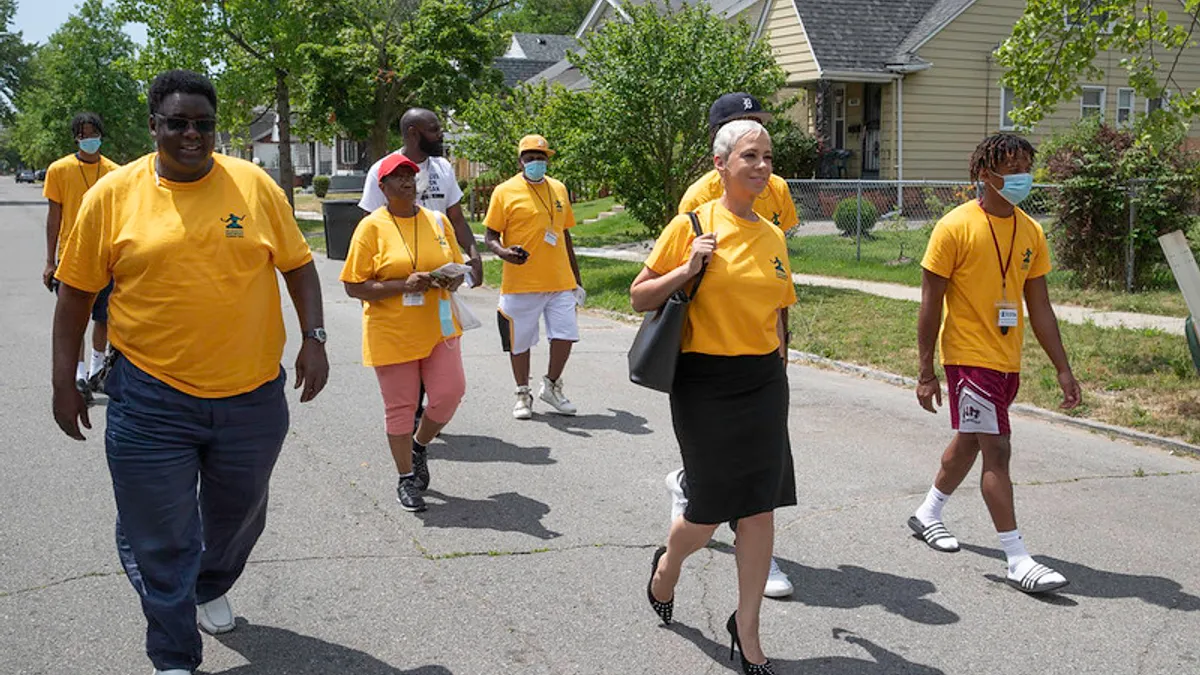UPDATED, Oct 14, 2020: The Supreme Court ruled Tuesday that the Trump administration can end counting early for the 2020 census, approving the suspension of a lower court decision that had extended the count deadline.
Self-response and field data collection operations will now conclude on Oct. 15, the Census Bureau announced. So far, 99.9% of housing units have been counted in the 2020 Census.
The latest order could help “clear the way” for President Trump to change the final count by excluding unauthorized immigrants from the figures used to determine congressional seats and Electoral College votes over the next decade, NPR reports.
Oct. 5, 2020: Data collection operations for the 2020 census count will continue through Oct. 31, according to a Census Bureau message sent to census takers. The message follows an announcement from U.S. Secretary of Commerce Wilbur Ross last week that the target date to conclude the census would be moved to Monday, Oct. 5.
Secretary Ross' decision had sparked outrage from a number of leaders and officials, including former Department of Justice Inspector General Michael Bromwich who tweeted Ross should be "held in contempt and sent directly to jail" if he cannot fairly account for how the new deadline was decided.
The count is at 99.4% completion as of Monday morning. Nineteen states and Puerto Rico have a near-complete count at 99.9%, while Alabama holds the lowest count rate at 96.9%. Two-thirds of housing units have responded online, by phone or by mail, with the other 33% of counts have been collected by census takers.
Aug. 11, 2020: The U.S. Census Bureau announced last week that it will stop counting efforts for the 2020 census on Sept. 30, a month earlier than previously planned.
The new deadline applies to all counting initiatives, including self-response, door-knocking, mail and phone collection. Instead, the bureau plans to "improve the speed" of the current count to complete data collection by the statutory Dec. 31 deadline.
The Census Bureau’s decision to expedite the reporting deadline will likely impact cities' count accuracy, putting federal funding at risk as many jurisdictions are already struggling to achieve complete counts due to the pandemic.
"The Census is more than a headcount," Boston Mayor Marty Walsh said in a statement. "As our city battles the COVID-19 crisis, and works towards a more equitable recovery, it’s more important than ever that everyone fills out the census so we get the resources we need."
High stakes in Boston
Mayor Walsh's city already faces unique challenges in achieving an accurate count, including hosting a high-share of renters, representing 66% of the city’s population, according to a Boston city official. In 2010, only 67% of renters responded to the Census, compared to 86% of homeowners.
Boston also has a large number of people living in "group quarters" like college dorms, prisons, rehabilitation facilities and nursing homes. The city is home to about 150,000 college students, for example, creating obstacles for the city as young adults ages 18 to 29-years-old are less likely to report participating in the census than adults in all older age groups. Fifty-six percent of young adults say they or another person in their household has participated, compared to 76% of adults ages 30 to 49, Pew Research reports.
The city has deployed a number of initiatives to address these challenges, including sending letters, texts and robo-calls to over 50,000 families and 70,000 seniors; distributing more than 5,000 flyers at the city’s top meal sites; and hosting 44 community events from Aug. 3 to Aug. 28 in high-traffic areas of historically undercounted neighborhoods.
The stakes to overcome these barriers are high. For every Massachusetts resident who doesn’t complete the Census, the Commonwealth of Massachusetts could lose out on over $2,300 in federal funding, according to a letter written by Mayor Walsh.
The "hardest-to-count" city
Detroit, projected to be the hardest-to-count city in 2020, is also working hard to reach a 100% self-response rate — though that number currently stands at 48.8% for the city, compared to the state's relatively high response rate of 69%.
One of the biggest challenges for Detroit’s count is the number of vacancies within the city, said Detroit 2020 Census Campaign Executive Director Victoria Kovari. Other contributing factors include a high number of renters; a significant digital divide; and a large minority population, considered a hard-to-count group, she said.
Before COVID-19, the city had a robust plan to tackle those counting challenges by showing up in-person to places like parent-teacher conferences and senior citizen apartment buildings. "You name it, we were going to go where Detroiters are," Kovari said, noting all of that planning "blew up" with the onset of the pandemic.
In an effort to pivot its approach to counting, the city census team has hosted digital events like online Census bingo and virtual block parties, Kovari said. The group has also set up shop at a dozen grocery stores almost every week, attended Black Lives Matter protests and visited about 20-25 food distribution sites a week since the end of May.
From COVID-19 to civil unrest to the economic uncertainty and the changing timeline, everything about this Census has been unprecedented, Kovari said. And despite the city’s best efforts, she said she’s not optimistic about this year’s count.
Frustrations and potential for an extension
The City of Houston’s Planning & Development Department Director Margaret Wallace Brown echoed that sentiment. "This shortened timeline frustrates the heck out of me," she wrote in an email interview. "It diminishes our ability to have an accurate count. It eliminates any ability to regain the time lost when COVID-19 derailed our ability to interact with the public."
And the numbers don’t lie: Houston is currently at a 54.1% return rate compared to 63.5% in August 2010, according to Brown.
"Federal funding that comes from census numbers feed Houstonians, provide roofs over their heads, fixes the roads they drive on and provides them support after natural disasters," she wrote. "Without an accurate count, they won’t have the data they need to make these decisions."
Other officials also appear frustrated by the shortened timeline. Immediately following the Census Bureau's decision to expedite the deadline, a group of former bureau directors called on Congress to extend the legal deadline for the 2020 census and to require data collection continue through Oct. 31 as originally planned.
There is currently some potential for such an extension, NPR reports. Democrats have teed up legislation that would push the deadline in the latest coronavirus relief bill. And Republicans so far have offered additional funds for data collection, but no deadline extension.




















